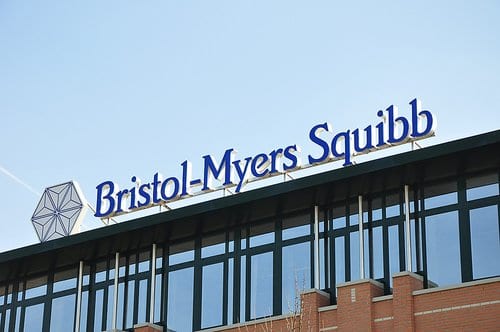
BMS/AZ fat disorder drug gains FDA approval
pharmafile | February 26, 2014 | News story | Research and Development, Sales and Marketing | AstraZeneca, BMS, FDA, hep C, metreleptin, myalept
Bristol-Myers Squibb and partner AstraZeneca have been granted FDA approval for a new drug to treat rare and potentially fatal disorders involving loss of body fat.
Myalept (metreleptin for injection) is now available as an aide to diet, and as a replacement therapy for the treatment of complications of leptin deficiency in patients with congenital or acquired generalised lipodystrophy.
The drug, which is a recombinant analogue (laboratory-created form) of human leptin, is the first and only treatment approved by the FDA for these patients. Generalised lipodystrophy patients experience a loss of fat tissue, especially under the skin, leading to low levels of leptin.
Leptin deficiency causes serious imbalance in the body, leading to fat accumulation in muscles and organs such as the liver. The deficiency can lead to diabetes, pancreatitis and fatty liver disease.
The treatment had been co-developed between AZ and BMS but it will soon become the sole responsibility of the former Anglo-Swedish firm.
AstraZeneca confirmed in a statement that it “is working to complete the transfer of the Biologics License Application for Myalept from Bristol-Myers Squibb”.
This comes after AstraZeneca bought into a number of diabetes alliance assets with BMS in a complex deal worth $7 billion in total. One of the terms of the deal saw AZ acquire much of Amylin Pharmaceuticals for $3.4 billion, the company which originally developed Myalept.
Amylin will soon be merged with AstraZeneca, and seemingly the rights to Myalept will then become owned by AZ alone.
Outside of the technicalities of the deal, Briggs Morrison, chief medical officer at AstraZeneca said: “We are pleased that Myalept will be available to patients in the US. Myalept is the first approved therapy, as an adjunct to diet, to help treat the complications of leptin deficiency affecting the lives of children and adults with generalised lipodystrophy.
“Myalept represents a significant treatment advancement for people living with this serious and rare disorder. We are committed to supporting this patient community and are dedicated to ensuring the appropriate patients who are prescribed Myalept will also have a comprehensive patient support programme available to them.”
The US regulator has asked the firms to conduct seven post-marketing studies of the drug to assure the agency of its long term safety.
Hepatitis C
Meanwhile, BMS has also been given a ‘breakthrough designation’ from the FDA for its DCV dual regimen treatment daclatasvir and asunaprevir, for use as a combination therapy in the treatment of genotype 1b chronic hepatitis C infection.
This designation is designed to speed-up the review process by several months and could mean a new challenger in the increasingly competitive hep C market will be available in the US this year.
The competition includes the new and expensive hep C pill from Gilead known as Sovaldi (sofosbuvir), which is expected to reach peak annual sales of $5 billion after it was approved in the US late last year.
Two weeks before this approval in late November, the US regulator also approved Janssen’s Olysio (simeprevir). And in 2011, the FDA approved two other pills for hepatitis C, both in the protease inhibitor class: Merck’s Victrelis (boceprevir) and Vertex Pharmaceuticals’ Incivek (telaprevir).
But despite an increasingly saturated market, BMS is still expected to see blockbuster sales from its drug – should it be approved – given the high rates of the infection in the US.
Brian Daniels, senior VP of global development and medical affairs, R&D at Bristol-Myers Squibb, said: “This is an important milestone for Bristol-Myers Squibb as we continue our strategic focus on the development of innovative medicines to address areas of high unmet medical need, where potential expedited review can make a critical difference for patients.”
The firm has also received a similar accelerated review from the European Medicines Agency for daclatasvir to be used in combination with other agents for the treatment of chronic hepatitis C.
Ben Adams
Related Content

Roche’s Alecensa approved by FDA as lung cancer treatment
Roche has announced that the US Food and Drug Administration (FDA) has approved Alecensa (alectinib) …

GSK’s meningococcal vaccine candidate accepted for FDA review
GSK has announced that the US Food and Drug Administration (FDA) has accepted for review …

FDA grants ODD to Candel Therapeutics’ pancreatic cancer treatment
Candel Therapeutics has announced that the US Food and Drug Administration (FDA) has granted Orphan …







